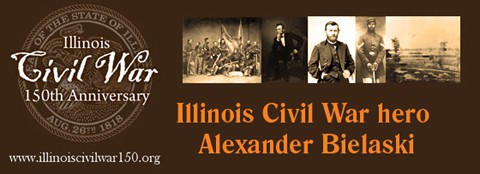
SPRINGFIELD – Although he’s not a part of the current exhibit at the Old State Capitol concerning the Polish armed forces in Afghanistan, the spirit of Illinois Civil War hero Alexander Bielaski is a 150-year-old reminder of how closely Illinois and Poland have been linked throughout our history.

The photo exhibit “The Polish armed forces in the International Security Assistance Force mission in the Islamic Republic of Afghanistan” opened Tuesday, November 15 at the Old State Capitol State Historic Site in downtown Springfield. The exhibit was prepared by the Ministry of Defense and Ministry of Foreign Affairs of the Republic of Poland, and can be seen through November 29 at the Old State Capitol.
The exhibit deals with modern Polish forces, many of which have fought alongside units from Illinois. That bond between Poland and Illinois forces goes back at least 150 years. An estimated 200 Poles from Illinois enlisted to fight for the Union cause during the Civil War. One was among Illinois’ earliest battle casualties of the war, Polish-born Captain Alexander Bielaski.
On November 7, 1861, almost exactly 150 years prior to the opening of the exhibit at the Old State Capitol, the 50-year-old Bielaski died while attempting to rally faltering Federal troops at the Battle of Belmont, Missouri. Bielaski rode in front of the men, “urging us on to victory,” as one admiring soldier recalled. When his horse was disabled the captain took up a musket, shouting “come on, I will lead you.” When this did not have the desired effect Bielaski threw down the musket, “snatched the stars and stripes and called on the boys to rally around the glorious old flag.” Men had just begun to gather “when a ball passed through his head, and he fell to the ground without knowing what hurt him. I hated to see the blood flowing from the head of one so noble and brave.” Bielaski’s exploits at Belmont were noted with admiration in official reports of the battle. Colonel John A. Logan ended his eyewitness description of those moments with the remark, “A braver man never fell on the field of battle.” General John A. McClernand wrote that his aide’s “bravery was only equaled by his fidelity as a soldier and patriot. He died, making the Stars and Stripes his winding sheet. Honored be his memory!”
Bielaski was born in 1811 and joined the unsuccessful struggle for Polish independence in 1831, receiving a serious wound during the defense of Warsaw. He landed in America in 1832, and arrived in Illinois in 1837. Around 1840 Bielaski lived for a short time in Springfield, where he offered lessons in fencing and swordsmanship, and became acquainted with Abraham Lincoln. He worked in Washington, DC in the U.S. General Land Office until the early months of the war, then joined Company F of the 30th Illinois Infantry Regiment in August 1861 as a lieutenant. General John A. McClernand appointed him as an aide with the rank of captain. Bielaski took part in the organization of Federal forces for a strike down the Mississippi River. Influenced by his experience in the European military and his knowledge of the Napoleonic Wars, days before his death Bielaski proposed that some of McClernand’s cavalry troops be equipped with lances and trained in their use.
The Old State Capitol State Historic Site, administered by the Illinois Historic Preservation Agency, was the seat of Illinois government from 1839 to 1876 and was the center of Civil War recruitment efforts for the state. Ulysses S. Grant, Abraham Lincoln, and Stephen A. Douglas are among the many famous Illinoisans who worked there. The site in downtown Springfield is open for free public tours.
http://www.state.il.us/hpa/hs/old_capitol.htm
